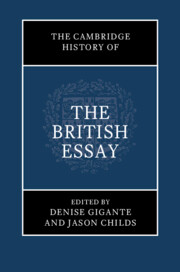Book contents
- The Cambridge History of the British Essay
- The Cambridge History of the British Essay
- Copyright page
- Contents
- Illustrations
- Contributors
- Acknowledgements
- Preface to a History in the Manner of an Essay
- Part I Forming the British Essay
- Part II The Great Age of the British Essay
- Part III Assaying Culture, Education, Reform
- Part IV Fractured Selves, Fragmented Worlds
- Part V The Essay and the Essayistic Today
- 39 The Eye and the I: Essay and Image
- 40 Of Human Suffering: The Essay and Ekphrasis
- 41 After Empire: Postcolonialism and the Essay
- 42 Performance and the Irish Essay
- 43 The Essay and the Public Intellectual
- 44 Essayism in Literary Theory
- 45 The Essay in the Career of the Contemporary British Novelist
- 46 Blogging in Britain: Essays in the Digital Age
- 47 The Essay, Ecocriticism, and the Anthropocene
- Book part
- Bibliography
- Index
46 - Blogging in Britain: Essays in the Digital Age
from Part V - The Essay and the Essayistic Today
Published online by Cambridge University Press: 31 October 2024
- The Cambridge History of the British Essay
- The Cambridge History of the British Essay
- Copyright page
- Contents
- Illustrations
- Contributors
- Acknowledgements
- Preface to a History in the Manner of an Essay
- Part I Forming the British Essay
- Part II The Great Age of the British Essay
- Part III Assaying Culture, Education, Reform
- Part IV Fractured Selves, Fragmented Worlds
- Part V The Essay and the Essayistic Today
- 39 The Eye and the I: Essay and Image
- 40 Of Human Suffering: The Essay and Ekphrasis
- 41 After Empire: Postcolonialism and the Essay
- 42 Performance and the Irish Essay
- 43 The Essay and the Public Intellectual
- 44 Essayism in Literary Theory
- 45 The Essay in the Career of the Contemporary British Novelist
- 46 Blogging in Britain: Essays in the Digital Age
- 47 The Essay, Ecocriticism, and the Anthropocene
- Book part
- Bibliography
- Index
Summary
This chapter examines the British essay in the age of the Internet, a period which has radically reshaped literary culture. Online magazines and journals now outnumber their print precursors, vastly increasing the venues available to budding essayists. But this transformation was predated by a more pivotal online trend: blogging. Beginning in the early years of the new millennium, and ending, effectively, with the rise of social media, the golden age of blogging allowed a wave of self-published writers to revolutionise literary criticism and cultural theory. Free from professional aims and ambitions, experimental and avidly personal, their essays left a lasting impression on both literary journalism and the academy. This chapter explores the underacknowledged possibilities and legacies of blogging, surveying the ways in which prominent bloggers reimagined the essay form.
Keywords
- Type
- Chapter
- Information
- The Cambridge History of the British Essay , pp. 696 - 711Publisher: Cambridge University PressPrint publication year: 2024

